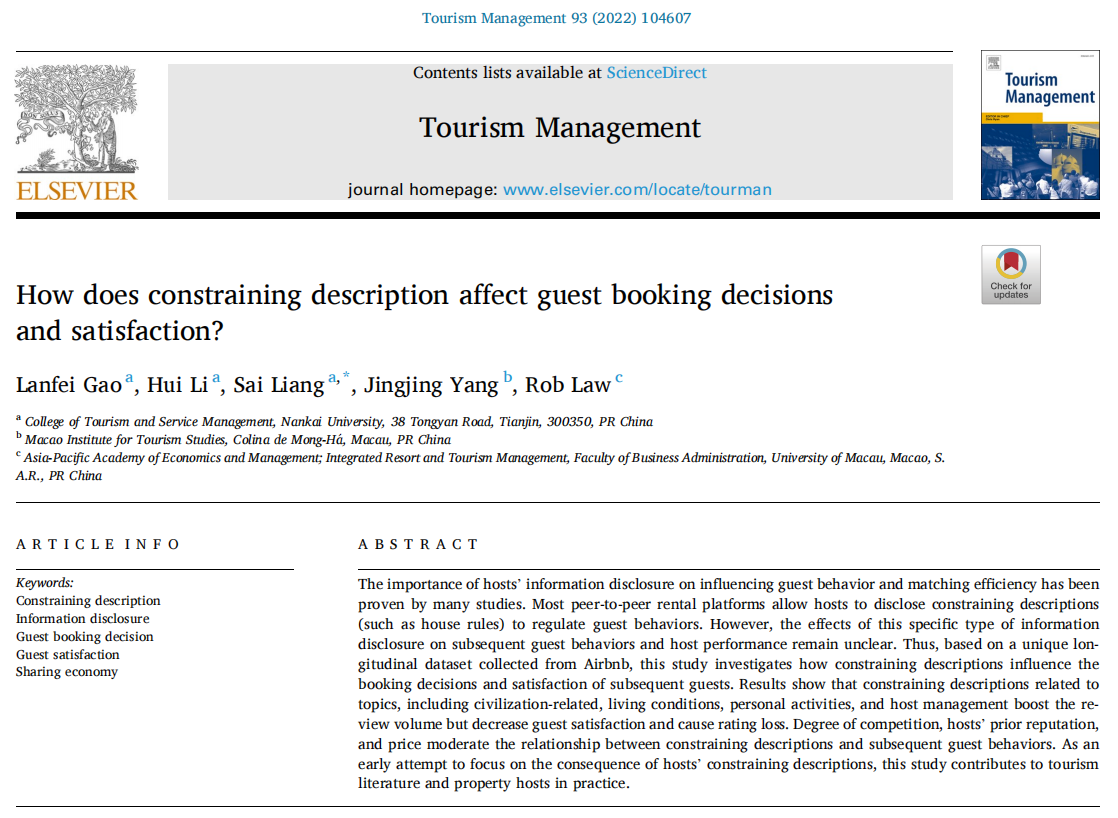The paper entitled "How does constraining description affect guest booking decisions and satisfaction?" by doctoral students Gao Lanfei and their advisor Professor Li Hui, along with Associate Professor Liang Sai and external collaborators, has been published in the journal "Tourism Management," one of the top three international journals in the field of tourismanagement.

The importance of host information disclosure for guest behavior and matching efficiency has been confirmed by many studies. Most peer-to-peer rental platforms allow hosts to disclose constraining descriptions (such as house rules) to regulate guest behavior. However, the impact of this specific type of information disclosure on subsequent guest behavior and property performance is unclear. On the one hand, if hosts establish strict house rules, guests seeking leisure may perceive their freedom as limited, which could decrease their willingness to purchase. On the other hand, according to the persuasion knowledge model, guests are more likely to identify positive statements from sellers as persuasive information and perceive high deception. From this perspective, house descriptions, including house rules (prohibitive statements), are more likely to be perceived as trustworthy, thereby increasing guest willingness to purchase. Therefore, this study aims to explore the impact of constraining descriptions disclosed by hosts on subsequent guest booking decisions and satisfaction by constructing a conceptual framework and collecting data from Airbnb.
This study constructed a panel regression model with fixed effects by collecting a unique longitudinal dataset covering 90,322 Airbnb properties from January 2019 to June 2020. The study observed how the dynamic changes of house rules affect guest attention and satisfaction and explored the moderating effects of external competition, host reputation, and price. The study found that (1) constraining descriptions include four themes: guest civility, living conditions, personal activities, and host management. (2) When hosts disclose more detailed house rules (including more themes), guest booking decisions represented by review numbers and demand increase. However, disclosing detailed constraining descriptions may have a negative impact on guest satisfaction because it may increase their expectations. (3) When hosts face higher external competition intensity, the positive impact of disclosing constraining descriptions on guest booking decisions and the negative impact on guest satisfaction will weaken. When hosts are awarded the "Superhost" badge by the platform, the positive impact of disclosing constraining descriptions on guest booking decisions is amplified, and the negative impact on guest satisfaction is weakened. When hosts set a relatively high price, the negative impact of more detailed house rules on guest satisfaction will be amplified. As one of the earliest attempts to study the impact of attention to constraining description disclosure (such as house rules on Airbnb) on guest behavior, this study provides new insights for future research on generating content for specific types of hosts. The results of this study also have practical implications for shared accommodation owners and platform managers, helping them understand how to improve performance and matching efficiency by adjusting the strategy of constraining information disclosure.
"Tourism Management" is one of the top academic journals in the field of tourism management, with an impact factor of 10.967, ranking among the top 5% of all management journals. It is one of the three top-tier international journals in the field of tourism management and one of the three A-level journals in the field of FMS tourism management. It is authoritative in the field of tourism management journals and has extremely high academic influence and reputation.
(Translator:LIANG Sai,Proofreading:SUN Ning)

